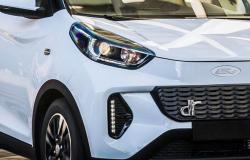The electric vehicles They have quickly gone from being a rare bright spot in the fight against climate change to a cause for concern.
A slowdown in the adoption of electric vehicles has potentially huge implications for the energy transition. It also has ramifications for the many financial institutions that have committed to decarbonizing the loans and investments they make.
For lenders like Bank of America Corp., HSBC Holdings Plc and JPMorgan Chase & Co. which have committed to reducing emissions associated with their financial activities in high-carbon sectors, the automotive industry seemed to have a relatively clear path. Unlike certain hard-to-shrink industries, where reaching net zero depends on scaling up nascent technologies, a widely accepted assumption was that government incentives and demand for electric vehicles by consumers for a smooth transition.
By extension, banks could simply sit back and wait to achieve their goals without much effort. But now, Recent statements from many of the world’s largest automakers have given bankers reason to question that strategy..
Ford Motor Co., for example, is cutting back on expenses. The automaker is delaying the appearance of new electric vehicles and cutting prices, since it qualified the electric vehicles as “the main obstacle for the entire company at this time.” Ford has forecast losses of electric vehicles this year of up to 5.5 billion dollars.
Mercedes-Benz Group AG, which had planned to go all-electric in certain markets by the end of the decade, now says it will make hybrid and combustion-engine vehicles “well into the 2030s.” Meanwhile, Volkswagen AG has also retreated from its ambitious plan electric vehiclesand its VW brand also plans to sell more plug-in hybrids as sales of electric vehicles they slow down.
Automakers are feeling the pain of still-high inflation, weak economic growth in much of Europe and a prolonged recovery in China. At the same time, the end of lucrative subsidies is driving up product prices. electric vehicleswhich, along with gaps in charging infrastructure, are limiting interest from potential buyers.
While all this may complicate the plans of lenders who are betting heavily on the electric vehiclesnot all the news is gloomy.
“Despite the current announcements, we understand that the trend of electric vehicles is unstoppable in the medium term and we remain confident at this time in our goal for 2030”said Antoni Ballabrigaglobal director of sustainability intelligence and advocacy Banco Bilbao Vizcaya Argentaria SA.
One reason for this may be that, while established automakers are losing market share, the share of electric-only automakers in global new passenger vehicle sales is increasing. Another positive factor is that underlying fundamentals for electric vehicle manufacturing look goodaccording to Daan Walterdirector of the strategy team RMI, an energy and climate nonprofit. Costs of critical minerals and batteries have dropped significantly over the past 18 months, while current trends in the electric vehicles They are actually ahead of what the International Energy Agency It says it is necessary for net zero alignment.
“The current trend is actually going faster than net zero”Walter said. “It is one of those glimmers of hope that we have in the transition”.
Road transport accounts for around 15% of greenhouse gas emissions, making the shift to vehicles cleaners be a central pillar of efforts to meet climate change mitigation goals. Decarbonizing the automotive sector is also essential for banks that have committed to financing net zero emissions and that have companies such as ford and Volkswagen among its largest clients.
But lenders who want to reinforce climate good faith will have to think globally. They will have to learn to “not just look under Western streetlights,” Walter said, because China is far ahead of the West in developing electric vehicles.
Almost 60% of plug-in car sales will be made in China this year, while growth in Europe and the United States will slow, according to BloombergNEF. The administration Biden is responding in part to this dynamic by introducing broad tariff increases on a range of Chinese imports, including electric vehicles and lithium ion batteries, while USA seeks to expand national production capacity.
It is also “very likely” that the slowdown in electric vehicles in Europe gives rise to a “political intervention in response to the predominance of China and East Asian automakers,” he said. Mahesh Roydirector of investment strategies at Institutional Investors Group on Climate Change.
For banks, it is a reminder that achieving their own goals depends largely on the economics and politics of the transition.
The attack of Republican Party to the criteria IS G is generating more victories at the expense of sustainable investment. The latest victims are exchange-traded funds. The US market for ETFs centered on IS G is faltering, and at least 27 ETFs classified as aligned with environmental, social and governance principles have been liquidated so far this year, said Shaheen Contractor, senior analyst at IS G of Bloomberg Intelligence. That compares to 36 for all of last year. And the outlook for the rest of the year is not promising. In a context of increasing fund closures, only two have been introduced this year ETFs IS G in Americathe smallest amount since Bloomberg Intelligence started tracking the data.
- Across Europe, banks are trying to figure out how to handle a growing risk lurking in residential mortgage portfolios: energy consumption.
- Calpersthe largest state public pension fund in USAwill vote against all directors of Exxon Mobil Corp.saying the oil giant is undermining shareholders’ rights.
- The US Commodity Futures Trading Commission expects to finalize its guidance for carbon credits within the next six months, as it seeks broader measures against fraud and manipulation in the beleaguered market.
- With the assistance of Craig Trudell.
©2024, Bloomberg






